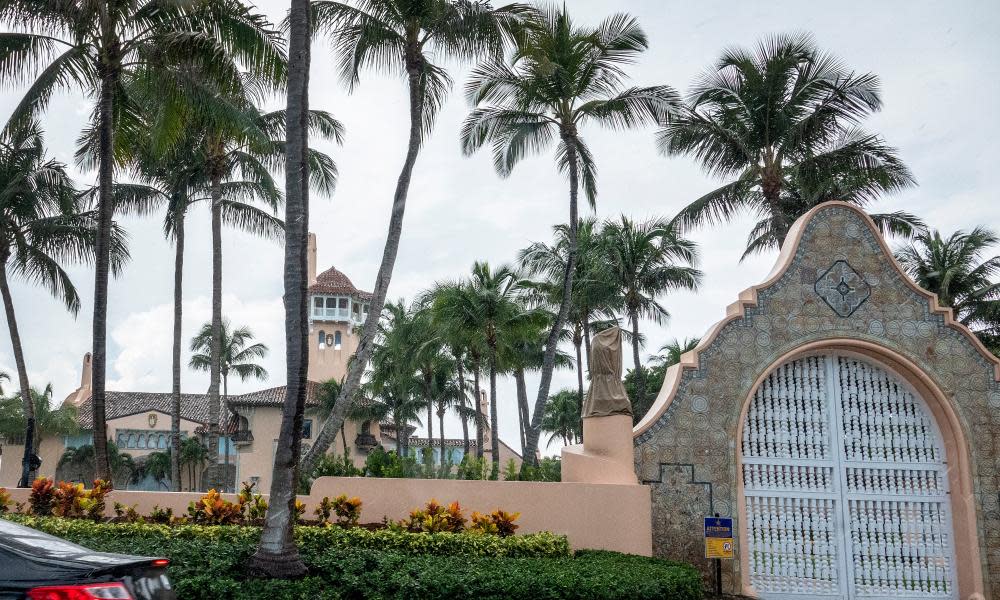Trump not required to provide sworn declaration that FBI ‘planted’ evidence

A federal judge ruled on Thursday that Donald Trump would not have to provide a sworn declaration that the FBI supposedly “planted” some of the highly-sensitive documents seized from his Mar-a-Lago resort, as he has suggested, until his lawyers have reviewed the seized materials.
The order from US district court judge Aileen Cannon, who is overseeing the special master case and is a Trump appointee, also pushed back several key interim deadlines that consequently extends the review’s final date of completion from the end of November to mid-December.
Cannon’s ruling means Trump does not have to confirm under oath his insinuations that the FBI manufactured evidence – one of several assertions he has made, without evidence, in recent weeks that could be used against him should he be charged over illegal retention of government documents.
The order marked the first clash between Cannon and the so-called special master, senior US district court judge Raymond Dearie, who had ordered Trump certify by Friday whether the inventory of seized materials included anything that had not been in his Mar-a-Lago resort in Palm Beach, Florida.
Related: Special master in Trump documents case described as fair and no-nonsense
Dearie’s instruction left Trump’s lawyers in a dilemma: if they acknowledged that the FBI had not planted evidence and in fact, documents marked classified were at the property, that could be used as evidence against Trump given all such documents had previously been subpoenaed.
The special master had also ordered Trump to sort any documents over which he intended to assert executive privilege into two buckets: privilege to shield materials from people outside the executive branch, such as Congress, and people inside the executive branch, such as the justice department.
But in siding with Trump’s lawyers who resisted making such declarations, in part because it could form defense arguments should Trump be indicted, Cannon’s order said that the former president did not have to make such a statement, at least for now.
“There shall be no separate requirement on plaintiff at this stage, prior to the review of any of the seized materials, to lodge ex ante final objections to the accuracy of defendant’s inventory, its descriptions, or its content,” the judge wrote.
Cannon also extended the entire timeline of the special master process, delaying the final completion of the review to 16 December, as she pushed back a number of key interim deadlines that would govern how quickly the examination of the 11,000 documents proceeds.
The delays would not affect the justice department’s criminal investigation into Trump’s potential retention of national defense information, after the US court of appeals for the 11th circuit ruled this month the government could regain access to about 100 documents marked classified.
But it does ensure that Trump now does not have to address under oath whether he supposedly declassified the documents found at Mar-a-Lago or that the FBI planted some of the seized materials – he has supplied no evidence for either claim – until after the midterm elections in November.
The judge wrote that Trump and the justice department would have until 5 October to finalize a contract with a vendor to digitize the 11,000 documents so the review can commence, and gave the justice department until 13 October to make copies of the documents available to Trump’s team.
The justice department should file a notice of completion by 14 October, the ruling said, and then Trump would have 21 days after the notice is filed to designate whether they think any of the documents are protected by privilege and which are presidential or personal records.
“Plaintiff’s designations shall be on a document-by-document basis,” Cannon wrote. “For any document that plaintiff designates as privileged and/or personal, plaintiff shall include a statement adequately explaining the precise basis for the designation.”
The former president’s lawyers and the justice department then have no more than 10 days to submit to Dearie a log about any disagreements over the privilege claims, after which the order instructed the special master to issue a report and recommendations to resolve any disputes.
Cannon also sided with Trump regarding how the process should take place: Cannon rejected the recommendation by the justice department to have Trump make privilege claims on a rolling basis and ordered Trump to make one comprehensive log at the end of the 21-day review period.


